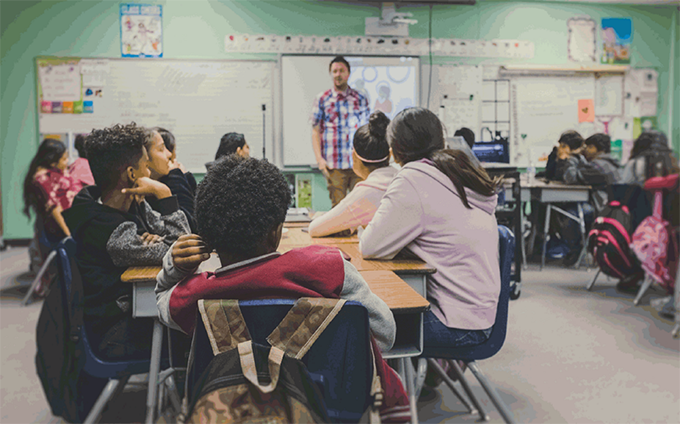
“I feel happy when I play with “¡Musiquem!”. I don’t know how to explain it, it’s happiness. Maybe later I can become a great cellist. »
It was with these words that Sara, a primary school student, told how she felt after the concert that her school orchestra gave in the symphony hall of the Auditorio de Castellón de la Plana ( Spain), his hometown.
Sara, along with her classmates, are part of ¡Musiquem! , a project that has been running for five years in two primary schools in Castellón de la Plana and that was designed by teachers with university researchers . The principle: take advantage of music lessons and hours dedicated to musical practice to form orchestras.
Both schools are intercultural, and one of them has a large percentage of its population at risk of social and economic exclusion with, moreover, a deteriorated image of the center compared to other schools in the city.
All children from third to sixth grade spend two hours a week with Musiquem and participate in the school orchestra. In class, in addition to their music teacher and tutor, they work with two professional musicians.
The principle of these orchestras is to learn music while sharing it with other members of the educational community.
A project rooted in its environment
Music has tremendous potential to help with communication, positive coexistence and cross-cultural understanding. It can be of great benefit in primary music lessons.
The objective of this learning through sharing on which Musiquem! is to learn to know and use the possibilities and resources of the environment in order to participate, as far as possible, in its improvement and development. In this way, it opens the door to more direct contact between students and members of the community .
In one of the schools, orchestras of stringed instruments (violins and cellos) have been created; in the other, they work in popular music ensembles, with instruments such as electric guitars, bass guitars, drums, etc. using an informal learning approach in the music classroom.
In all these cases, joint projects have been carried out with neighborhood organizations, NGOs, city councils, etc., articulated around musical practice and bodily expression.
Musiquem (in Valencian: “to make music”) is developed thanks to a daily collaboration between the primary school teachers, both tutors and music specialists, and two resident musicians who come into the classroom and facilitate all activities.
The program takes place during school hours and therefore allows the participation of all students. It provides concerts and artistic interventions in retirement homes, health centers and other associations located near the school.
Finally, the program strives to involve families in the project so that they actively participate in the activities.
A music education
Musiquem ‘s objective is to build spaces of participation in which, through artistic creation and practice, students, at the same time as they learn music, perform social service. It is therefore not only an education for music, but also an education through music. The actions take the following form:
- The project takes place during school hours and consists of two weekly sessions. All 3 rd , 4 th , 5 th and 6 th year students at the school take part in the project .
- The program consists of the creation of school orchestras in which students have the opportunity to learn to play an instrument, to compose, to sing, to listen, etc.
- The program is designed in close collaboration between the research group and the teachers of the school. Based on the specific needs of the school, contextualized actions are proposed.
- The implementation is ensured by the teachers of the school (tutors or music specialists) in collaboration with resident musicians. The synergies arising from the potential of the two personalities, teachers and musicians, are essential to the implementation of the project.
- Teachers and specialized musicians are present simultaneously in the class and coordinate to carry out the actions together.
- Instrumental learning is based on joint practice, auditory education and body experimentation. The discovery of music theory is introduced at later stages and is gradually adapted to the specific needs of musical performance.
- Based on instrumental practice and bodily expression, other types of activities are carried out with the aim of rendering a service. In this way, the social impact of the project is promoted.
- The program is implemented in parallel in the aforementioned courses. Common actions are carried out with students of different learning levels. The promotion of peer tutoring is the key to the success of these actions, both in terms of learning and group cohesion.
Linking the effects of learning through art to the meaning of service makes it possible to better adapt educational practices to our reality.
In doing so, we encourage knowledge, learning to do and, above all, learning to live together, learning to live with others and learning to be.
Author Bios: Lidon Moliner Miravet is Profesora Titular de Universidad del área de Didáctica y Organización Escolar and Alberto Cabedo Mas is Profesor del Área de Música, Departamento de Educación y Didácticas Específicas both at the Universitat Jaume I
